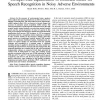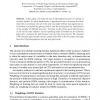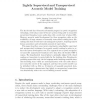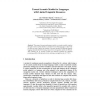107
click to vote
ICASSP
2011
IEEE
14 years 5 months ago
2011
IEEE
We propose an environment population projection (EPP) approach for rapid acoustic model adaptation to reduce environment mismatches with limited amounts of adaptation data. This a...
123
click to vote
TASLP
2010
14 years 8 months ago
2010
In the presence of environmental noise, speakers tend to adjust their speech production in an effort to preserve intelligible communication. The noise-induced speech adjustments, c...
119
click to vote
TSD
2010
Springer
15 years 13 days ago
2010
Springer
In this paper, we study the use of heterogeneous data for training of acoustic models. In initial experiments, a significant drop of accuracy has been observed on in-domain test s...
108
click to vote
LRE
2010
15 years 15 days ago
2010
In this paper the transcription and evaluation of the corpus DIMEx100 for Mexican Spanish is presented. First we describe the corpus and explain the linguistic and computational mo...
136
Voted
CSL
2002
Springer
15 years 1 months ago
2002
Springer
The last decade has witnessed substantial progress in speech recognition technology, with todays state-of-the-art systems being able to transcribe unrestricted broadcast news audi...
108
click to vote
ICASSP
2010
IEEE
15 years 2 months ago
2010
IEEE
It has become common practice to adapt acoustic models to specific-conditions (gender, accent, bandwidth) in order to improve the performance of speech-to-text (STT) transcriptio...
115
click to vote
NAACL
2001
15 years 3 months ago
2001
In automatic speech recognition (ASR) enabled applications for medical dictations, corpora of literal transcriptions of speech are critical for training both speaker independent a...
108
click to vote
LREC
2008
15 years 3 months ago
2008
Multilingual Automatic Speech Recognition (ASR) systems are of great interest in multilingual environments. We studied the case of the Comunitat Valenciana where the two official ...
106
click to vote
CICLING
2005
Springer
15 years 4 months ago
2005
Springer
This paper discuses preliminary results on acoustic models creation through acoustic models already in existence for another language. In this work we show as case of study, the cr...
106
click to vote
ICPR
2008
IEEE
2008
IEEE
Application of triphone clustering in acoustic modeling for continuous speech recognition in Bengali
16 years 3 months ago
The performance of the acoustic models is highly reflective on the overall performance of any continuous speech recognition system. Hence generation of an accurate and robust acou...




